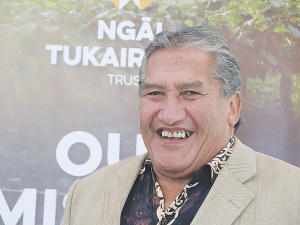Hawke’s Bay sheep and beef farmers warned to monitor stock water wells
Sheep and beef farmers in Hawke's Bay are being urged to keep a close eye on the wells that supply water to their stock.
 Ngahiwi Tomoana mobilised an eclectic mix of around 400 people – from gang members to nannies – to help clean up Hawke’s Bay’s cyclone damaged orchards.
Ngahiwi Tomoana mobilised an eclectic mix of around 400 people – from gang members to nannies – to help clean up Hawke’s Bay’s cyclone damaged orchards.
Rival gang members, nannies and school kids are some of the unsung heroes of the recovery of orchards in Hawke's Bay hit by Cyclone Gabrielle. Peter Burke reports.
The idea of such an eclectic mix of people working together seems somewhat incredulous, but the skill of Naghiwi Tomoana made it happen.
Known as the 'go-to voice of Māori’, Tomoana served as the chair of Ngāti Kahungunu, for a record 26 years and was the instigator in sending a group of Māori leaders to a boot camp at Stanford University in the US.
But when Cyclone Gabrielle hit the Hawke's Bay, causing massive damage to kiwifruit and apple orchards, Tomoana took a bold new step to help people. The problem for many orchardists was while there was fruit on their vines and trees it was worthless because it had been inundated by water and could not be sold.
However, that fruit still had to be taken off the vines and trees so that they could recover and the challenge was who could do this and quickly. One of the orchards belonged to the Ngai Tukairangi Trust, a finalist in the 2023 Ahuwhenua Trophy for the top Māori horticulturalists of the year. It also owns a 40 hectare block, much of which went under water in the floods. The trust also has a close relationship with Ngāti Kahungunu.
Tomoana told Hort News Hawke's Bay was a region of two halves - with one half totally devastated and other places completely undamaged. Speaking to a couple of orchardists, including Ngai Tukairangi, he decided to try and help them out.
Exercising his mana as a Māori leader, he mobilised - through Facebook - upwards of 400 people to get out to the orchards and pick the fruit and throw it on the ground where later it would be mulched up. They worked in a mixture of kiwifruit and apple orchards but answered the call from anyone who wanted help.
"People responded in droves. We had so many volunteers that we reached out to other orchardists that needed support," Tomoana says.
"Clusters of secondary school students and community gangs put their hands up and came to support us.
The surprising thing was we had people working alongside Mongrel Mob members and other rival gangs and they just behaved as though they were long lost brothers. They worked well alongside nannies, school children, and built up a real fraternity."
He says some of the young people had never seen fruit on a tree before and it was a new and exciting experience for them.
"They jumped into the task in hand boots and all and had a bit of fun at the same time with different groups competing against each other and a bit of fruit being thrown around in a good natured way."
Tomoana says they mainly worked in corporate or whanau orchards and but for strict health and safety rules they could have done more work in the community.
"I am sure these young people are going to have stories to tell in the years to come and when anything else pops up they'll be encouraging others to do the job too," he adds. "It was such a self-fulfilling experience for them that they'll never forget."
Tomoana says the other nice aspect to this project was that it was done for free and the orchardists who were under a great deal of stress were very grateful for the help.
Voting has started for the renewal of DairyNZ's milksolids levy.
The most successful catchment groups in NZ are those that have 'a source to sea' approach.
Associate Agriculture Minister and Manawatu dairy farmer Andrew Hoggard says the free trade agreement (FTA) negotiated with India is not a bad deal and his party, Act, will support it when it goes before Parliament.
Newly released data from Environment Canterbury (ECan) Farm Environment Plan (FEP) audits are showing a dramatic lift in environmental performance across the region.
A solid recovery of global dairy prices this year makes a $9.50/kgMS milk price almost a shoo-in for this season.
As New Zealand marks the United Nations’ International Year of the Woman Farmer 2026 (IYWF 2026), industry leaders are challenging the misconception that women only support farming.

OPINION: Here w go: the election date is set for November 7 and the politicians are out of the gate…
OPINION: ECan data was released a few days ago showing Canterbury farmers have made “giant strides on environmental performance”.